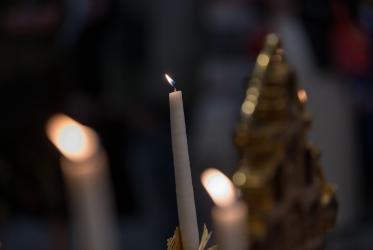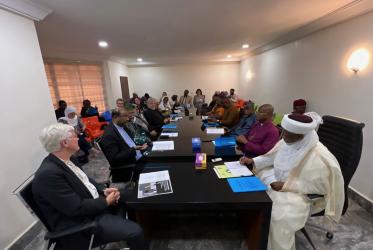After leading a workshop in Nigeria covering HIV and AIDS response, Jessie Fubara-Manuel recalls when AIDS response was in a much darker era. “The first stage of response was full of fear, characterized by judgment and rejection, a feeling that AIDS was a punishment from God,” she said.
Thankfully, many people have evolved beyond that theology, she said. “Governments and churches have been collaborating with local and national HIV-responders to educate people about HIV transmission.”
Now, she said, she worries about a sense of complacency which, if augmented, can tragically lead to destruction. “In Nigeria, the AIDS epidemic continues,” she said, “because Nigeria is a country at war with itself, and it is more vulnerable to HIV.”
Sexual- and gender-based violence are significant risk factors in increasing the rates of HIV infection. In a workshop held 25-26 May, organizers used contextual Bible study (CBS) to help church leaders and theologians explore causes and responses to sexual- and gender-based violence. CBS involves identifying Biblical texts that help advance themes and issues occurring in a community at any given time.
Sponsored by the West Africa Regional Office of the World Council of Churches Ecumenical HIV and AIDS Initiatives and Advocacy (WCC-EHAIA), the workshop will ultimately help future church leaders as they work in Nigeria.
Workshop participants received practice in identifying scriptures that will help people cope in their own communities, Fubara-Manuel said.“We are trying to help people see the process of using CBS to focus on issues related to health, HIV, violence, quality of life, and dignity. In other words, how can faith-based leaders use the scriptures wisely to discuss the issues?”
Within any given community, every local story is different, she added. At the end of the workshop, organizers asked participants to formulate three goals for their communities, then send a report after three months. “In this way,” she said, “we will find out the impact.”
Workshop participants also showed their support for the a “Thursdays in Black” campaign against sexual and gender-based violence. By wearing black, they became part of a global movement urging an end to violence against women.
Along with women, young people are particularly vulnerable to HIV, and they need to feel accepted by their churches, said Rev. Dr Nyambura Njoroge, WCC-EHAIA coordinator. “Churches have a vital role in encouraging people to take responsibility for their own sexual health,” she said. “Stigma and discrimination can be a death sentence.”
When people with HIV are accepted in their communities and in their churches, they live longer and the very acceptance serves as a healing balm. “Here, the church can make the difference between a person thriving and perishing,” she added.
Prior to the workshop, EHAIA representatives met with UNAIDS and UNICEF country representatives to discuss ways to eliminate mother-to-child transmission of HIV. “Churches can do tremendous work in reaching out to pregnant women who may not have access to adequate pre-natal care,” said Njoroge.
Related link:
World Council of Churches Ecumenical HIV and AIDS Initiatives and Advocacy





